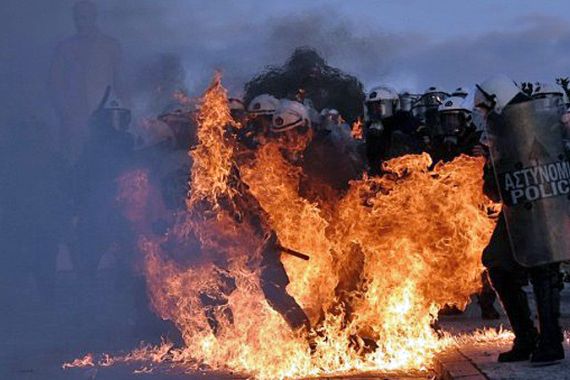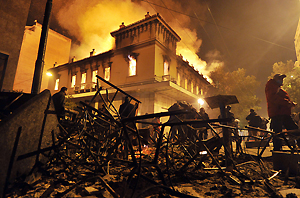Greece calls for elections after debt riots
General elections announced for April, hours after parliament approved new austerity cuts and protests raged in Athens.

Greece will hold general elections in April, the government has said, hours after parliament voted through tough new austerity measures aimed at saving the country from bankruptcy.
“This government has one to one-and-a-half months left,” Pantelis Kapsis, a government spokesman, told journalists on Monday. “We will finish up in March, and elections will be held in April.”
| IN PICTURES: Greeks protest | |||||||||||
|
Lucas Papademos, the Greek prime minister who formed a coalition government in November after the fall of George Papandreou’s socialist administration, had indicated that he did not intend to serve the full two years remaining of parliament’s mandate.
He said that his only aim was to negotiate the write-down of part of Athens’ debt and ensure that it qualified for a new European bailout of $171bn.
While he managed to push through the latest austerity measures, the two main parties each saw more than 20 of their MPs rebel, while the extreme-right LAOS party quit the coalition before the vote.
“The government believes that yesterday’s vote expressed our determination to go forward,” Kapsis said. “The Greek people want us to stay in the euro, and we will do whatever it takes to stay in the euro.”
Referring to European Union demands led by Germany for written pledges by party leaders to carry out the reforms demanded, Kapsis said they “must be given by Wednesday”.
Kapsis admitted that Wednesday’s meeting with European leaders to decide whether to release the new bailout “is going to be a difficult one”.
Athens aftermath
Meanwhile, firefighters doused smouldering buildings in the Greek capital, with crews sweeping rubble from the streets after rioting caused by the new harsh austerity measures approved on Sunday by legislators.
The cleanup started on Monday after at least 45 buildings were burned, including one of Athens’ oldest cinemas. Dozens of stores and cafes were also smashed and looted in Sunday’s rioting.
The stench of tear gas still hung in the air on Monday morning, choking passers-by, according to the Associated Press.
|
“It would be a huge historical injustice if the country from which European culture sprang … reached bankruptcy and was led, due to one more mistake, to national isolation and national despair“ – Lucas Papademos, |
More than 170 people were hurt in the rioting which also broke out in other Greek cities.
The authorities said 106 police needed medical care after being injured by petrol bombs, stones and other objects hurled at them. At least 70 protesters were also admitted to hospital.
Police arrested at least 74 people and detained a further 92, while in several cases they had to escort fire crews to burning buildings after protesters prevented access.
The drastic cuts debated in parliament include axing one in five civil service jobs over the next three years and slashing the minimum wage by more than a fifth.
Legislators approved the bill in a 199-74 vote – to the relief of investors who pushed the Athens stock index up 5 per cent on Monday.
The vote paves the way for Greece’s international creditors to release $72bn in new rescue loans.
Analysts say bankruptcy could push Greece out of Europe’s euro currency union, drag down other troubled eurozone countries and further disrupt global markets.
As flames still burn in some parts of the city, the Greek people continued to express their anger.
“We should have left nothing standing. Not a stone, not the parliament. Because they are traitors. Tell me one of them
who is not a traitor,” former naval officer Petros Dogas told the Reuters news agency.
Architect Nikos Markou too expressed his disappointment in the nation’s legislators.
“This is not the fault of the people. This is the fault of those people in there. Everything started with them, and it’s been years now” he said.
MPs expelled
The front pages of the nation’s newspapers echoed those sentiments of anger and dissatisfaction.
“Night of terror” hollered the Tipos newspaper while Ta Nea said “they said yes under fire and tears”, juxtaposing the late-night parliamentary decision with the tear gas wafting in the air.
The coalition government of Papademos expelled 43 MPs from its ranks in parliament over dissent in the debt vote.
The Socialists and conservatives expelled 22 and 21 MPs, respectively, from their parliamentary groups early on Monday, reducing their majority in the 300-seat parliament from 236 to 193.
A third coalition partner, the rightist LAOS party, effectively withdrew from the government on Friday after its leader publicly opposed the deal.
Al Jazeera’s John Psaropoulos, reporting from Athens said the sizable majority had established clear support for the prime minister as the details of the cuts were pushed through parliament in coming weeks.
“It is a very important majority for the government it helps legitimise the measures,” he said.
Papademos told legislators shortly before they voted that they would be gravely mistaken if they rejected the package that demanded further pay, pension and job cuts, as this would threaten Greece’s place in the European mainstream.
“It would be a huge historical injustice if the country from which European culture sprang … reached bankruptcy and was led, due to one more mistake, to national isolation and national despair,” he said.
The chaos outside parliament showed how tough it will be to implement the measures.
“We are facing destruction. Our country, our home, has become ripe for burning; the centre of Athens is in flames. We cannot allow populism to burn our country down,” conservative politician Costis Hatzidakis told parliament.
